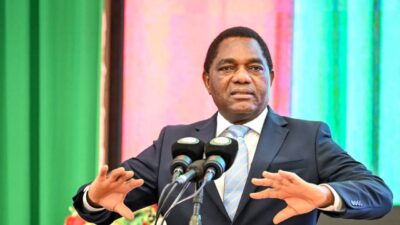The proposed measures in the 2025 national budget, coupled with previous policy pronouncements, provide a solid foundation for strong growth in the coming fiscal years, according to economist Patrick Chileshe.
Chileshe, a Zambian economist based in Kenya, said the proposed measures would have a greater impact in the medium term than in 2025 itself, as many of the initiatives will require time to bear fruit.
“The proposed measures in the 2025 national budget, coupled with previous policy pronouncements, provide positive grounds for strong growth in the next fiscal years,” Chileshe said in a statement on Wednesday.
He explained that the impact would be more significant in the medium term, as most of the policies would need time to take full effect.
Chileshe predicted positive economic growth in 2025, driven by a recovery in agricultural production and improvements in the energy sector on the supply side, while increased allocation to social sectors is expected to boost demand for goods and services.
“There would be positive growth in 2025 supported by recovery in agriculture production and energy sector on the supply side, while the allocation to the social sectors will boost demand for goods and services,” Chileshe said.
However, he cautioned that growth might fall short of the government’s target of 6.6 percent.
He pointed out that challenges in electricity generation could limit economic recovery.
“I do not expect electricity generation to quickly turnaround in 2025 to support other sectors. Expert estimates suggest this may need two to three rainy seasons of good rains to fill water reservoirs at various electricity generation plants to support full capacity operations,” he added.
Chileshe also highlighted other hurdles to growth, including the impact of tight monetary policy, which has led to higher borrowing costs and may hinder private sector recovery from the recent climate-related challenges.
“Other obstacles to growth include tight monetary policy, which has led to higher cost of borrowing, potentially hindering the recovery of the private sector from this climate change disaster,” he explained.
Despite these challenges, Chileshe remained optimistic about the medium-term outlook, forecasting that the proposed policies would drive economic growth in key sectors, including mining, agriculture, manufacturing, and household expenditure.
“I expect these measures to support growth levels of six percent and above, driven by recovery in mining, a resilient agriculture sector, a strong manufacturing base, and robust household expenditure,” Chileshe concluded.
The economist expressed believe that the combination of recovery in these sectors, alongside government’s policy framework, may position Zambia for sustained growth beyond 2025.
WARNING! All rights reserved. This material, and other digital content on this website, may not be reproduced, published, broadcast, rewritten or redistributed in whole or in part without prior express permission from ZAMBIA MONITOR.













Comments